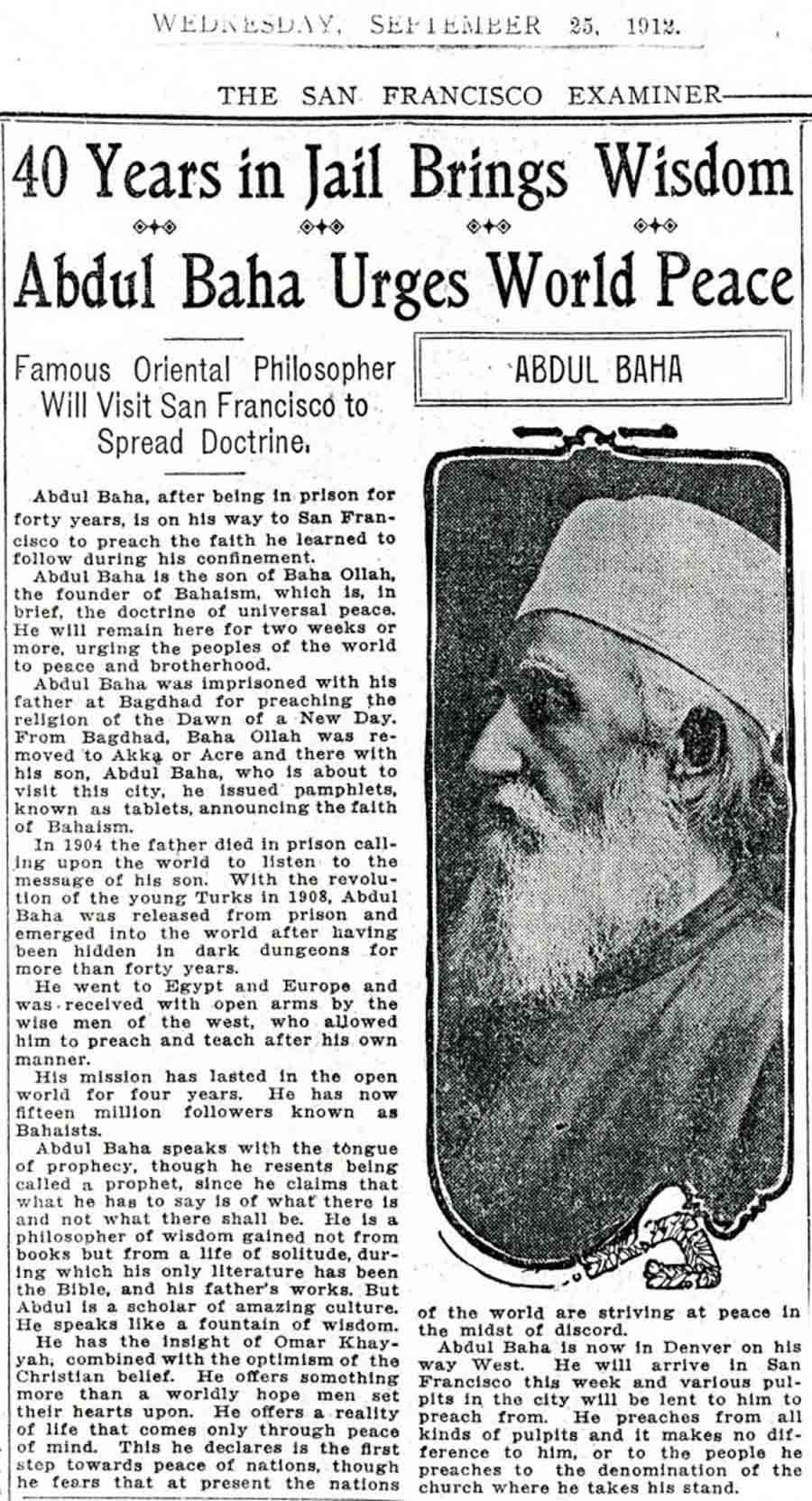As the world navigated the tumultuous landscape of World War I, the teachings of ‘Abdu’l-Bahá emerged as a beacon of hope and unity. His profound insights not only addressed the immediate challenges posed by war but also laid the foundation for a more harmonious global society. In observing the centenary of ‘Abdu’l-Bahá’s call for unity, it is imperative to delve into his teachings, examining their relevance in contemporary society while reflecting on their historical significance during a time of unprecedented strife.
To comprehend ‘Abdu’l-Bahá’s vision, one must first grasp the context in which he articulated his thoughts. The early 20th century was marked by a cacophony of nationalism, territorial disputes, and societal divisions. In this milieu, ‘Abdu’l-Bahá fervently advocated for the principles of unity and peace, urging individuals and nations to transcend their differences. His teachings emphasized the interconnectedness of humanity, positing that only through collective effort could the scourge of war be averted.
Central to ‘Abdu’l-Bahá’s teachings is the concept of unity in diversity. He articulated that the richness of human experience is found not in conformity but in the acceptance and celebration of differences. This idea resonates strongly today, where global conflicts often stem from misunderstanding and intolerance. ‘Abdu’l-Bahá asserted that the myriad cultures, traditions, and perspectives should be viewed as assets rather than obstacles. By fostering an environment of respect and understanding, societies can cultivate a more cohesive and harmonious existence.
In addressing the destructive forces of nationalism, ‘Abdu’l-Bahá contended that the allegiance to a single nation should never supersede a commitment to the broader human family. This notion was particularly prescient during World War I, a conflict that saw nationalistic fervor propel nations into animosity and warfare. ‘Abdu’l-Bahá encouraged individuals to foster a global perspective, one that recognizes the shared identity and rights of all people. Today, as the world grapples with issues of migration, integration, and global governance, ‘Abdu’l-Bahá’s insights remain strikingly pertinent.
Another cornerstone of his teachings is the principle of equality, particularly gender equality. ‘Abdu’l-Bahá ardently believed that the advancement of society hinges on the empowerment of both men and women. He argued that when women are given equitable opportunities, societies flourish. This egalitarian ethos was radical for its time and continues to be a rallying point for movements advocating for women’s rights globally. ‘Abdu’l-Bahá’s insistence on the equal capabilities of both genders underscores the integral role that inclusivity plays in building a peaceful and progressive society.
‘Abdu’l-Bahá’s teachings also highlight the significance of education as a transformative vehicle for fostering unity. He posited that education is not merely a means to acquire knowledge but a catalyst for societal elevation. Knowledge equips individuals with the capacity to think critically, fostering understanding and compassion. In an era where misinformation can spread rapidly, ‘Abdu’l-Bahá’s emphasis on the power of education resonates profoundly. Educational initiatives that promote critical thinking and empathy can serve as antidotes to divisive ideologies.
The call for diplomatic engagement and dialogue is another critical aspect of ‘Abdu’l-Bahá’s teachings. In the face of conflict, he advocated for open channels of communication and negotiation. He envisioned a world where diplomatic discourse supplanted militaristic responses, where disputes could be resolved through understanding rather than violence. In contemporary geopolitics, where tensions often escalate into conflict, ‘Abdu’l-Bahá’s advocacy for dialogue is a timely reminder of the power of conversation to bridge divides.
Furthermore, ‘Abdu’l-Bahá’s profound respect for religious plurality calls for mutual respect and cooperation among various faiths. He envisioned that the world’s religions, while distinct in their practices and beliefs, share a common purpose: to uplift humanity and instill moral values. Emphasizing universal ethics, he stirred a movement towards interfaith dialogue that seeks to unite rather than polarize. In an age marked by religious strife, embracing ‘Abdu’l-Bahá’s vision could pave the way for a more tolerant and interconnected world.
As we reflect on ‘Abdu’l-Bahá’s teachings a century after his profound call for unity, it is essential to recognize the enduring relevance of his messages. His prophetic insights possess the power to inspire collective action towards eradicating social injustices and fostering a culture of peace. Engaging with his principles invites individuals and communities alike to partake in the ongoing quest for unity amid diversity.
In conclusion, ‘Abdu’l-Bahá’s call for unity, articulated amidst the chaos of World War I, serves as a timeless reminder of our shared humanity. By embracing values such as unity in diversity, equality, education, diplomatic engagement, and respect for various faiths, society has the potential to transcend its limitations and build a future rooted in peace and cooperation. As we honor ‘Abdu’l-Bahá’s legacy, let us recommit ourselves to the ideals he championed—ensuring that the principles of unity and understanding continue to illuminate the path toward a more harmonious world.
